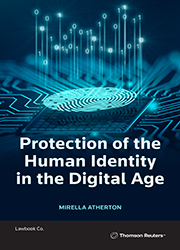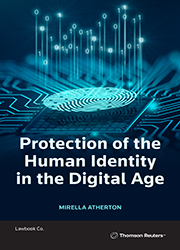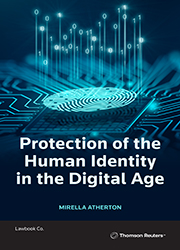
Protection of Human Identity in the Digital Age
|
Book $75.00 RRP |
Date: 29/09/2025 Code: 9780455249285 Thomson Reuters, AUSTRALIA |

Protection of Human Identity in the Digital Age
Price: $75.00
|
Browse:
Available Formats
| Format | Title | Date | Code | Price | |
|---|---|---|---|---|---|
| Book | Protection of Human Identity in the Digital Age | 29/09/2025 | 9780455249285 | $75.00 |
Add to cart

Protection of Human Identity in the Digital Age
Price: $75.00
|
| eBook - ProView | Protection of Human Identity in the Digital Age eBook | 15/09/2025 | 9780455249292 | $75.00 |
Add to cart

Protection of Human Identity in the Digital Age eBook
Price: $75.00
|
| Book+eBook | Protection of Human Identity in the Digital Age Book + eBook | 15/09/2025 | 43365695 | $98.00 |
Add to cart

Protection of Human Identity in the Digital Age Book + eBook
Price: $98.00
|
Description
An identity can be seen when you search another person’s eyes with your eyes. Perhaps it is looking into someone’s soul and appreciating the totality of their life experiences. However it is described, a person’s identity is linked to the uniqueness that lies deep inside the nuclei of almost every cell in the body, where we store our genes that make up our genomes and ultimately our DNA. This book will start by discussing the human identity, including the theories behind privacy, surveillance and the harmful effects of unwanted intrusion. The book will then progress to the types of personal data that can be collected from human beings including financial information and health information. The book will consider the intrinsic and extrinsic value of individual characteristics and recognisable traits before examining digital footprints and digital profiles.
People in families have similar physical traits and character traits that derive from parents and grandparents, great grandparents and ancestors. Our connections to others related to us and around us are a key part of our individual identity. Those in our community and across the globe are relying on collective good will to protect our individual identities. In the meantime, the digital revolution has brought about improvements in efficiency but our mental health and physical health is suffering. Some forms of technology that involve processing of personal information have become a threat not only to our privacy but also to our humanity. It is here where we need to turn to the modern concept of justice.
Justice is grounded in legal theories which have been tried and test over centuries, but past concepts of justice don’t always apply when significant shifts within the population occur. This book argues that technology is reshaping individual identities at such a rate that it has affected the class structure within our societies. The introduction of legislation has only touched the surface of the deeper issues at stake. Highly sophisticated thinking is required to respond to the changing nature of communication, the impact of technology on social ordering and in shielding targets from data exposure and pre-planned information manipulation. As jurisdictions around the world deal with changes that involve human interactions with digital technology this book asks you to engage your brain, to think and to learn rather than accept. It will explain why we need to protect our identity.
Table of Contents
Contents
Protection of the Human Identity in the Digital Age
Preface
About the Author
Contents
INTRODUCTION
PART 1 – HUMAN IDENTITY
Chapter 1 – Theories behind Individual Privacy
1.1 Introduction
1.2 Theories about identity
1.3 Hobbs (1588 – 1679)
1.4 Locke (1632 – 1704)
1.5 Hegel (1770 - 1831)
1.6 Foucault (1926-1984)
1.7 Conclusion
Chapter 2 – Surveillance
2.1 Introduction
2.2 Global developments in mass surveillance
2.3 Public spaces
2.4 Exploitation or Empowerment?
2.5 The Modern Panopticon
2.6 Conclusion
Chapter 3 – The harmful effects of unwanted intrusion
3.1 Introduction
3.2 Economic power
3.3 Cyberbullying
3.3 Biometric identification systems
3.4 Cybersecurity
3.5 Conclusion
PART 2 – TYPES OF DATA
Chapter 4 – Sensitive personal information
4.1 Introduction
4.2 Data within the global context
4.3 Wearable skins and devices
4.4 Data mining
4.5 Web scraping, screen scraping and data trawling
4.6 Conclusion
Chapter 5 – Financial information
5.1 Introduction
5.2 Consumer Data Right (CDR)
5.3 Open banking design
5.4 Leaving behind traditional systems
5.5 Financial data security
5.6 The principles of transparency in practice
5.7 Digital currencies
5.8 Conclusion
Chapter 6 – Health information
6.1 Introduction
6.2 Personal information collected in the course of providing a health service
6.3 Sharing of genetic information
6.4 Health data breaches
6.5 Big Data and Blockchain
6.6 The dark web
6.7 Conclusion
PART 3 – INDIVIDUAL CHARACTERISTICS AND RECOGNISABLE TRAITS
Chapter 7 - Human Recognition
7.1 Introduction
7.2 The human body
7.3 The public and private persona
7.4 Biometrics
7.5 DNA
7.6 Conclusion
PART 4 – DIGITAL FOOTPRINTS AND DIGITAL PROFILES
Chapter 8 – Digital knowledge and understanding
8.1 Introduction
8.2 Website visits, online searches and purchases
8.3 Email communication and digital platform interactions
8.4 Location data
8.5 Cookies
8.6 Espionage
8.6 Conclusion
Chapter 9 - Children’s Privacy
9.1 Introduction
9.2 Children’s Development
9.3 Online behaviour
9.4 Parental influence
9.5 Commercial value of children’s data
9.6 Networked Toys
9.7 Specific legislation
9.8 Conclusion
Chapter 10 – Conclusions
 Information Technology
Information Technology